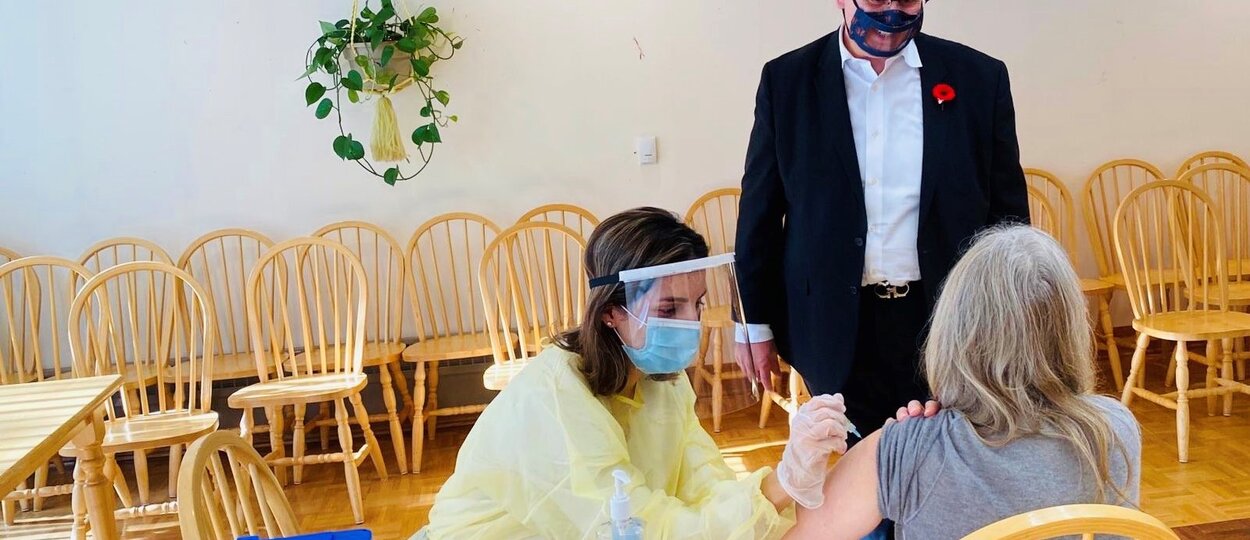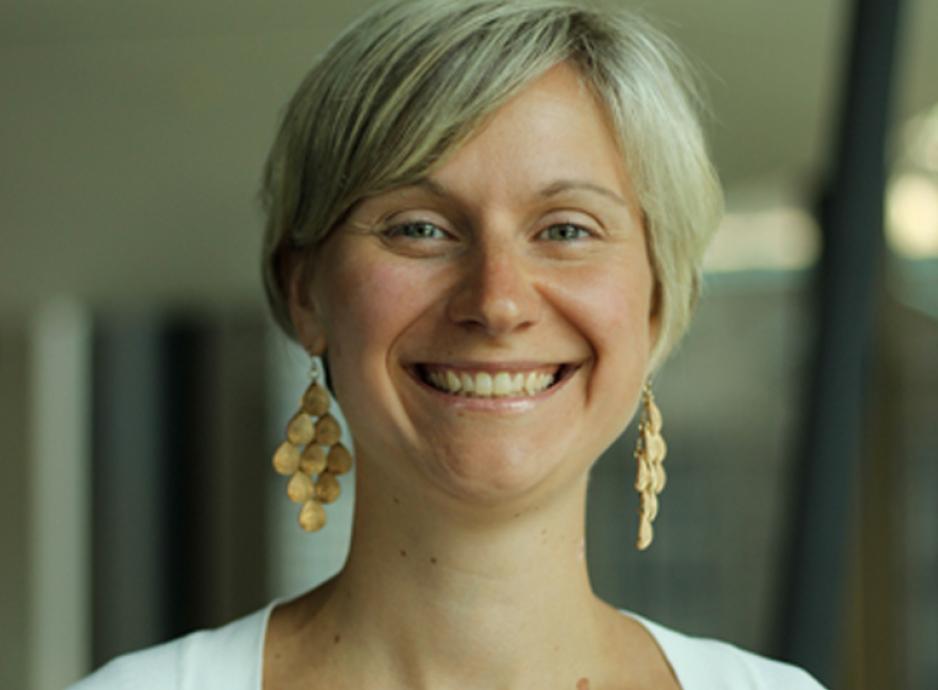Yasamin Tayefehchamani describes experience providing patient care in a community pharmacy
At Tanya Sklierenko’s Markland Wood Pharmacy in Etobicoke, the protective glass barriers were recently made permanent all over the dispensary. They’re one of many adaptions she’s made since the beginning of the COVID-19 pandemic.
“Our physical space has changed and our priorities have too. As a pharmacist-owner, I have an added level of responsibility, not only to keep my patients safe, but also my staff,” said Sklierenko, who is a preceptor and Assistant Professor – Teaching Stream at the Leslie Dan Faculty of Pharmacy.
Fourth-year APPE student Yasamin Tayefehchamani started her block seven rotation with Sklierenko in late November. Having worked in a community pharmacy earlier this year, Tayefehchamani says things have come a long way since March.
“Earlier in pandemic the key problem was minimizing virus spread in the community. Back then, little was known about the virus and we weren’t using PPE or masks. There were lots of questions we didn’t know the answers to,” said Tayefehchamani.
Today, challenges remain in community pharmacy, but there are also new ones. For example, many pharmacies are delivering more medications to patients’ homes, which creates communications challenges for patients and pharmacists.
“It’s harder to counsel a patient about a new medication over the phone. I think it’s more difficult for some individuals to remember instructions, and it’s harder for me to ensure patients are clear about what I told them,” said Tayefehchamani.
There are communications barriers inside the pharmacy too. While protective, the glass barrier surrounding the dispensary makes it challenging for many elderly patients to hear the pharmacist. Added layers of protection — including face shields, masks, and physical distancing — amplify the communications challenges.
“Simple things like speaking loudly, slowly and repeating key information are effective. In some cases I have stepped out of the dispensary to talk to the patient from a distance and provided written instructions,” said Tayefehchamani, who believes these techniques may be helpful after the pandemic.
Sklierenko agrees that clear communication is key. This includes keeping patients informed about COVID-19, communicating changes in pharmacy procedures (i.e. delivery, hours, etc.) as well as communicating policy and procedural changes with staff while monitoring for burnout. Above all, she believes thanking and acknowledging staff are critical.
“Students are trying hard to stay focused, slow down, and provide patients with the same level of care as before the pandemic. I think with open communication, they welcome the unique learning opportunities brought by the pandemic,” said Sklierenko. She believes that student learning has doubled, many becoming frontline health-care workers overnight.
“I have the same expectations of today’s students as I did before in terms of coming to work ready to apply their academic knowledge, but students are also instrumental in addressing patient concerns,” said Sklierenko.
Patients are experiencing heightened anxieties, particularly related to vaccines. According to Sklierenko and Tayefehchamani, the top question from patients is will pharmacists administer COVID-19 vaccines.
“We do our best to reassure of the safety of the COVID-19 vaccine process, from development to rollout. There’s a lot of information — and misinformation — that we need to address by focusing on the science in an accessible way,” said Sklierenko.
Not only are patients experiencing heightened anxieties, but so are many pharmacists and pharmacy staff.
“I’ve seen fear in the eyes of my staff, but they put it aside once they remember why they’re here — to help people. I do my best to acknowledge their fears, tell them its okay to feel this way, and reassure them that together we will get through the day,” said Sklierenko.
Tayefehchamani says that she’s come a long way since the beginning of the pandemic in terms of dealing with her own concerns around putting herself and loved ones at risk.
“I have parents at home who could be at risk, but this pharmacy really takes care of its staff,” said Tayefehchamani, noting that Sklierenko takes staff temperatures, asks daily COVID-19 questionnaires, checks in with public health to ensure compliance, and introduced the new glass barriers.
According to Sklierenko, students like Tayefehchamani were instrumental over the last few months, not only in dealing with the added COVID-19 pressures, but also ensuring that patients receive the correct medication, appropriate counseling and managing drug therapy problems.
“I work with students to ensure they don’t lose sight on the daily operations, which remain critical during the pandemic. Maintaining a professional level of service is harder than it was before COVID-19, but we’ve learned to be more patient and kinder to one another,” said Sklierenko. “Students have stepped up to the challenge and continue to uphold the profession during the pandemic.”
For Tayefehchamani, she says the APPE rotations were an extraordinary experience, one that she never expected.
“There are challenges, but the last few months were a huge learning opportunity that will make me a better pharmacist,” said Tayefehchamani. “The pandemic has changed everyone’s lives, but it’s also had a positive impact on our growth, both as pharmacists and as citizens.”
Tayefehchamani learned that leadership and teamwork are critical skills for frontline health-care professionals during a crisis.
“We must work as a team to navigate the safety of personnel, patients and the community broadly. This really can’t be done by one person. It must be tackled by a team of professionals,” said Tayefehchamani.
She adds that leadership means taking initiative to keep up-to-date with ministry guidelines, ensure staff are comfortable, and ensure the pharmacy is not putting patients as risk.
“Delivering care to patients is multilayered. It’s not just providing medication management, but also considering their holistic care needs during the pandemic,” said Tayefehchamani.
“I also learned a lot about advocating for our profession. It’s important to show society what we can do and how we can help in a crisis.”
By: Eileen Hoftyzer
More News
Image

Faces of PharmSci: Kinda Karra
MSc student Kinda Karra, working with Clinician Scientist Carlo DeAngelis, is studying why some breast cancer patients experience pain after chemotherapy and how a small blood sample could help detect signs of this reaction.
Read More
Image

Trade tariffs on pharmaceuticals ‘not the way to go’: U of T expert releases new study showing disruptions and cost increases
Trade tariffs on Canadian pharmaceuticals expected to increase costs in the U.S. and strain drug supply chains.
Read More
Image

Northern Ontario rotation inspires new perspective on pharmacy practice
Alina Montgomery’s rotation on Manitoulin Island demonstrated the importance of pharmacists in northern communities
Read More

